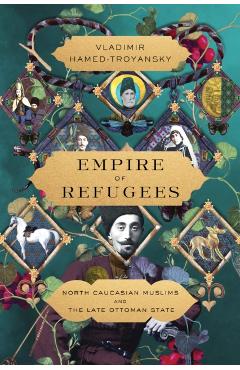Empire of Refugees: North Caucasian Muslims and the Late Ottoman State - Vladimir Hamed-troyansky

Detalii Empire of Refugees: North Caucasian
libris.ro
282.72 Lei
314.13 Lei
History
Vladimir Hamed Troyansky
Empire of Refugees: North Caucasian - Disponibil la libris.ro
Pe YEO găsești Empire of Refugees: North Caucasian de la Vladimir Hamed Troyansky, în categoria History.
Indiferent de nevoile tale, Empire of Refugees: North Caucasian Muslims and the Late Ottoman State - Vladimir Hamed-troyansky din categoria History îți poate aduce un echilibru perfect între calitate și preț, cu avantaje practice și moderne.
Preț: 282.72 Lei
Caracteristicile produsului Empire of Refugees: North Caucasian
- Brand: Vladimir Hamed Troyansky
- Categoria: History
- Magazin: libris.ro
- Ultima actualizare: 28-10-2025 01:22:05
Comandă Empire of Refugees: North Caucasian Online, Simplu și Rapid
Prin intermediul platformei YEO, poți comanda Empire of Refugees: North Caucasian de la libris.ro rapid și în siguranță. Bucură-te de o experiență de cumpărături online optimizată și descoperă cele mai bune oferte actualizate constant.
Descriere magazin:
Between the 1850s and World War I, about one million North Caucasian Muslims sought refuge in the Ottoman Empire. This resettlement of Muslim refugees from Russia changed the Ottoman state. Circassians, Chechens, Dagestanis, and others established hundreds of refugee villages throughout the Ottoman Balkans, Anatolia, and the Levant. Most villages still exist today, including what is now the city of Amman. Muslim refugee resettlement reinvigorated regional economies, but also intensified competition over land and, at times, precipitated sectarian tensions, setting in motion fundamental shifts in the borderlands of the Russian and Ottoman empires. Empire of Refugees reframes late Ottoman history through mass displacement and reveals the origins of refugee resettlement in the modern Middle East. Vladimir Hamed-Troyansky offers a historiographical corrective: the nineteenth-century Ottoman Empire created a refugee regime, predating refugee systems set up by the League of Nations and the United Nations. Grounded in archival research in over twenty public and private archives across ten countries, this book contests the boundaries typically assumed between forced and voluntary migration, and refugees and immigrants, rewriting the history of Muslim migration in the nineteenth and early twentieth centuries.

Produse asemănătoare
Produse marca Vladimir Hamed Troyansky

Empire of Refugees: North Caucasian Muslims and the Late Ottoman State - Vladimir Hamed-troyansky
![]() libris.ro
libris.ro
Actualizat in 28/10/2025
282.72 Lei